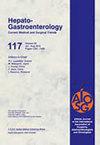Predicting hepatocellular carcinoma recurrence and survival
引用次数: 3
Abstract
Background: Beta blockers can inhibit tumor growth and metastases, while necroinflammation can enhance these tumor properties. Objective: To determine whether beta blockers and necroinflammatory disease predict tumor recurrence and/or overall survival following potentially curative therapeutic interventions for patients with hepatocellular carcinoma (HCC). Methods: The medical records of 36 adults with non-metastatic HCC who had undergone surgical resections and/or radiofrequency ablation (RFA) were retrospectively reviewed. In addition to post-intervention beta blocker usage and serum alanine aminotransferase levels greater than 2xULN, other variables commonly associated with recurrences such as number and size of tumors, state of differentiation and vascular invasion were included in univariate and multivariate analyses for recurrence and survival. Results: Vascular invasion (OR 29.3, 95% CI 2.6-33.6) and surgical resection (OR 0.19, 95% CI 0.04-0.90) emerged from univariate (p=0.003 and 0.03 respectively) and multivariate (p=0.005 and 0.048 respectively) regression as predictors of tumor recurrence whereas beta blocker usage (OR 0.03, 95% CI 0.04-0.9, p=0.03) and tumor recurrence (OR 6.7, 95% CI 1.6-28.1, p=0.026) correlated with overall survival. Conclusions: Neither beta blocker usage nor serum ALT levels predict HCC recurrences, but beta blocker usage is associated with improved overall survival following potentially curative therapeutic interventions for HCC in adults. Correspondence to: Dr. G.Y. Minuk, Department of Internal Medicine, University of Manitoba, John Buhler Research Centre, 715 McDermot Ave., Canada, E-mail: gminuk@cc.umanitoba.ca预测肝细胞癌复发及生存
背景:受体阻滞剂可以抑制肿瘤生长和转移,而坏死炎症可以增强这些肿瘤特性。目的:确定-受体阻滞剂和坏死炎性疾病是否能预测肝细胞癌(HCC)患者在潜在治愈性治疗干预后的肿瘤复发和/或总生存率。方法:回顾性分析36例接受手术切除和/或射频消融(RFA)治疗的成人非转移性HCC的医疗记录。除了干预后β受体阻滞剂的使用和血清丙氨酸转氨酶水平大于2xULN外,其他通常与复发相关的变量,如肿瘤的数量和大小、分化状态和血管侵犯,也包括在复发和生存的单因素和多因素分析中。结果:血管侵犯(OR 29.3, 95% CI 2.6-33.6)和手术切除(OR 0.19, 95% CI 0.04-0.90)从单因素(p=0.003和0.03)和多因素(p=0.005和0.048)回归中显示为肿瘤复发的预测因子,而β受体阻滞剂的使用(OR 0.03, 95% CI 0.04-0.9, p=0.03)和肿瘤复发(OR 6.7, 95% CI 1.6-28.1, p=0.026)与总生存率相关。结论:β受体阻滞剂的使用和血清ALT水平都不能预测HCC复发,但β受体阻滞剂的使用与成人HCC潜在治愈性治疗干预后总生存率的提高有关。通讯:Dr. G.Y. Minuk,内科,马尼托巴大学,John Buhler研究中心,加拿大麦克德莫特大街715号,E-mail: gminuk@cc.umanitoba.ca
本文章由计算机程序翻译,如有差异,请以英文原文为准。
求助全文
约1分钟内获得全文
求助全文
来源期刊

Hepato-gastroenterology
医学-外科
自引率
0.00%
发文量
1
审稿时长
1.9 months
期刊介绍:
Hepato-Gastroenterology has been discontinued as of 2015. Extremely limited quantities of back issues in print available for sale.
 求助内容:
求助内容: 应助结果提醒方式:
应助结果提醒方式:


